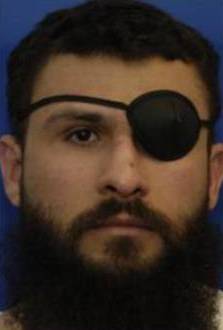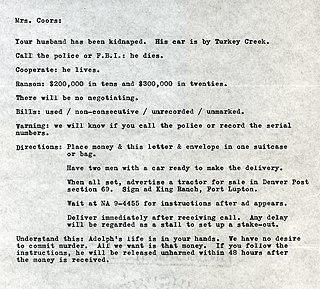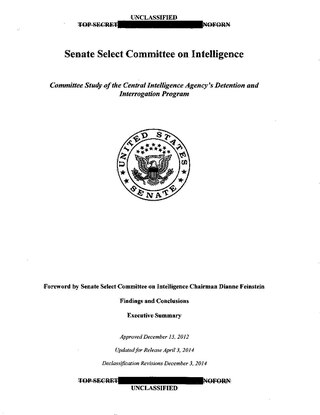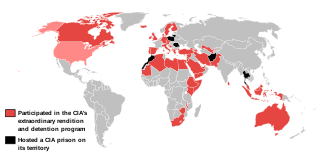Related Research Articles

Abu Zubaydah is a Palestinian citizen and alleged terrorist born in Saudi Arabia currently held by the U.S. in the Guantanamo Bay detention camp in Cuba. He is held under the authority of Authorization for Use of Military Force Against Terrorists (AUMF).
Khalid al-Masri is the name of a person alleged to have approached two 9/11 hijackers on a train in Germany and suggested that they contact an alleged al Qaeda operative in Duisburg.

Extraordinary rendition is a euphemism for state-sponsored kidnapping in another jurisdiction and transfer to a third state. The phrase usually refers to a United States-led program used during the War on Terror, which had the purpose of circumventing the source country's laws on interrogation, detention, extradition and/or torture. Extraordinary rendition is a type of extraterritorial abduction, but not all extraterritorial abductions include transfer to a third country.
Ghost detainee is a term used in the executive branch of the United States government to designate a person held in a detention center, whose identity has been hidden by keeping them unregistered and therefore anonymous. Such uses arose as the Bush administration initiated the War on Terror following the 9/11 attacks of 2001 in the United States. As documented in the 2004 Taguba Report, it was used in the same manner by United States officials and contractors of the Joint Interrogation and Debriefing Center at the Abu Ghraib prison in Iraq in 2003–2004.

The Salt Pit and Cobalt were the code names of an isolated clandestine CIA black site prison and interrogation center outside Bagram Air Base in Afghanistan. It was located north of Kabul and was the location of a brick factory prior to the Afghanistan War. The CIA adapted it for extrajudicial detention.

In 2005, The New York Times obtained a 2,000-page United States Army investigatory report concerning the homicides of two unarmed civilian Afghan prisoners by U.S. military personnel in December 2002 at the Bagram Theater Internment Facility in Bagram, Afghanistan and general treatment of prisoners. The two prisoners, Habibullah and Dilawar, were repeatedly chained to the ceiling and beaten, resulting in their deaths. Military coroners ruled that both the prisoners' deaths were homicides. Autopsies revealed severe trauma to both prisoners' legs, describing the trauma as comparable to being run over by a bus. Seven soldiers were charged in 2005.

Dilawar, also known as Dilawar of Yakubi, was an Afghan farmer and taxi driver who was tortured to death by US Army soldiers at the Bagram Collection Point, a US military detention center in Afghanistan.
Extrajudicial prisoners of the United States, in the context of the early twenty-first century War on Terrorism, refers to foreign nationals the United States detains outside of the legal process required within United States legal jurisdiction. In this context, the U.S. government is maintaining torture centers, called black sites, operated by both known and secret intelligence agencies. Such black sites were later confirmed by reports from journalists, investigations, and from men who had been imprisoned and tortured there, and later released after being tortured until the CIA was comfortable they had done nothing wrong, and had nothing to hide.
Khaled El-Masri is a German and Lebanese citizen who was mistakenly abducted by the Macedonian police in 2003, and handed over to the U.S. Central Intelligence Agency (CIA). While in CIA custody, he was flown to Afghanistan, where he was held at a black site and routinely interrogated, beaten, strip-searched, sodomized, and subjected to other cruel forms of inhumane and degrading treatment and torture. After El-Masri held hunger strikes, and was detained for four months in the "Salt Pit", the CIA finally admitted his arrest was a mistake and released him. He is believed to be among an estimated 3,000 detainees, including several key leaders of al Qaeda, whom the CIA captured from 2001 to 2005, in its campaign to dismantle terrorist networks.
Abdul Rahim Ghulam Rabbani is a citizen of Pakistan who was held in the United States Guantanamo Bay detainment camps, in Cuba.

Mohammed Ahmad Ghulam Rabbani is a citizen of Pakistan who was extrajudicially detained by the United States military at the Guantanamo Bay detention camp in Cuba from 2004 to 2023. He was never charged with a crime, was never tried, and was a subject of enhanced interrogation techniques.
American officials have reported that the late al Qaeda leader Osama bin Laden had numerous bodyguards. They reported that the detainees held in the Guantanamo Bay detention camp included at least 30 of Bin Laden's bodyguards.

Taxi to the Dark Side is a 2007 American documentary film directed by Alex Gibney, and produced by Gibney, Eva Orner, and Susannah Shipman. It won the 2007 Academy Award for Best Documentary Feature. It focuses on the December 2002 killing of an Afghan taxi driver named Dilawar, who was beaten to death by American soldiers while being held in extrajudicial detention and interrogated at a black site at Bagram air base.
"Enhanced interrogation techniques" or "enhanced interrogation" was a program of systematic torture of detainees by the Central Intelligence Agency (CIA), the Defense Intelligence Agency (DIA) and various components of the U.S. Armed Forces at remote sites around the world—including Bagram, Guantanamo Bay, Abu Ghraib, and Bucharest—authorized by officials of the George W. Bush administration. Methods used included beating, binding in contorted stress positions, hooding, subjection to deafening noise, sleep disruption, sleep deprivation to the point of hallucination, deprivation of food, drink, and medical care for wounds, as well as waterboarding, walling, sexual humiliation, rape, sexual assault, subjection to extreme heat or extreme cold, and confinement in small coffin-like boxes. A Guantanamo inmate's drawings of some of these tortures, to which he himself was subjected, were published in The New York Times. Some of these techniques fall under the category known as "white room torture". Several detainees endured medically unnecessary "rectal rehydration", "rectal fluid resuscitation", and "rectal feeding". In addition to brutalizing detainees, there were threats to their families such as threats to harm children, and threats to sexually abuse or to cut the throat of detainees' mothers.
Mohamed Farag Ahmad Bashmilah is a citizen of Yemen who is reported to have been a subject of the United States' controversial extraordinary rendition program. The American Civil Liberties Union states that he was apprehended by the Jordanian General Intelligence Department and tortured and interrogated for days, in Jordan, where he was: "turned over to agents who beat, kicked, diapered, hooded and handcuffed him before secretly transporting him to the U.S. Air Force base in Bagram, Afghanistan." They report that Bashmillah was held in extrajudicial detention in the United States' Bagram Theater Internment Facility, and the CIA network of black sites.
The CIA interrogation videotapes destruction occurred on November 9, 2005. The videotapes were made by the United States Central Intelligence Agency (CIA) during interrogations of Al-Qaeda suspects Abu Zubaydah and Abd al-Rahim al-Nashiri in 2002 at a CIA black site prison in Thailand. Ninety tapes were made of Zubaydah and two of al-Nashiri. Twelve tapes depict interrogations using "enhanced interrogation techniques", a euphemism for torture. The tapes and their destruction became public knowledge in December 2007. A criminal investigation by a Department of Justice special prosecutor, John Durham, decided in 2010 to not file any criminal charges related to destroying the videotapes.
Redha al-Najar is a citizen of Tunisia who was held in US custody in the Bagram Theater Internment Facility. He is notable for being one of a very small number of the detainees held in Bagram to have had a writ of habeas corpus submitted on his behalf.

Gul Rahman was an Afghan man, suspected by the United States of being a militant, who was a victim of torture. He died in a secret CIA prison, or black site, located in northern Kabul, Afghanistan known as the Salt Pit. He had been captured October 29, 2002.

The Committee Study of the Central Intelligence Agency's Detention and Interrogation Program is a report compiled by the bipartisan United States Senate Select Committee on Intelligence (SSCI) about the Central Intelligence Agency (CIA)'s Detention and Interrogation Program and its use of torture during interrogation in U.S. government communiqués on detainees in CIA custody. The report covers CIA activities before, during, and after the "War on Terror". The initial report was approved on December 13, 2012, by a vote of 9–6, with seven Democrats, one Independent, and one Republican voting in favor of the report and six Republicans voting in opposition.

The CIA controls black sites used by the U.S. government in its War on Terror to detain people deemed to be enemy combatants.
References
- 1 2 3 Smith, Craig S.; Mekhennet, Souad (2006-07-07). "Algerian Tells of Dark Term in U.S. Hands". New York Times . Archived from the original on 2009-04-23.
- 1 2 Taylor, Jerome (2006-07-09). "CIA sent me to be tortured in Afghan prison, says Algerian". The Independent . Archived from the original on 2012-11-05.
- ↑ Lee, Richard (2013-02-05). "SADC States Aided Illegal CIA Renditions". AllAfrica.com. Archived from the original on 2013-02-05.
- ↑ Roller, Emma; Nelson, Rebecca (2014-12-10). "What CIA Interrogators Did To 17 Detainees Without Approval". National Journal . Archived from the original on 2015-05-11.
Abu Hudhaifa was subjected to baths in which ice water was used, standing sleep deprivation for 66 hours that was discontinued due to a swollen leg attributed to prolonged standing, nudity, and dietary manipulation.